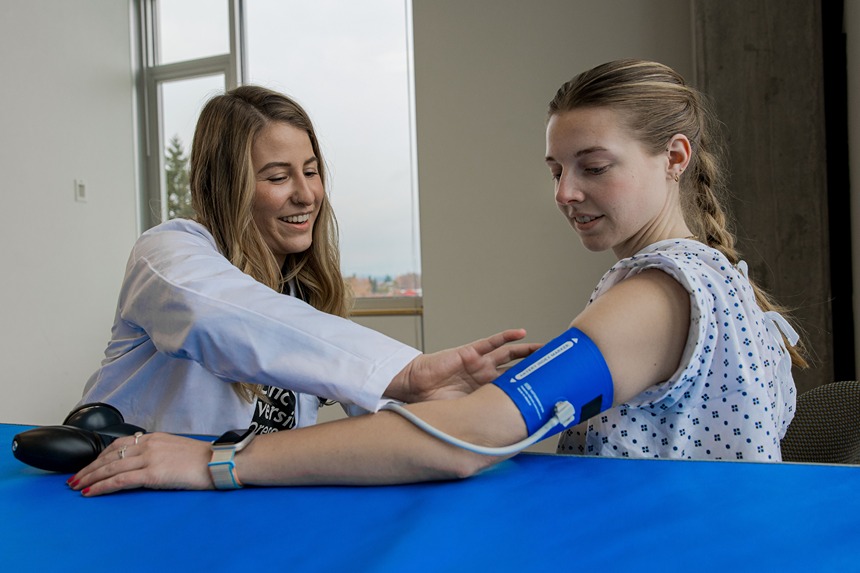Breaking Down Cultural Barriers Through The AHEC Scholars Program
 Growing up in the southern Oregon community of Ashland, Julia Senestraro ’21, PA ’25 heard stories of how her grandparents struggled to navigate the U.S. healthcare system as immigrants from Mexico.
Growing up in the southern Oregon community of Ashland, Julia Senestraro ’21, PA ’25 heard stories of how her grandparents struggled to navigate the U.S. healthcare system as immigrants from Mexico.
Healthcare in 1960s America was an English-only proposition, so the grandparents would often take one of their five children to doctor appointments to act as interpreters. It took a significant toll on the children, especially when Senestraro’s mother had to inform her own mother of a life-altering medical diagnosis.
The stories compelled Julia Senestraro to take action.
“My mom didn’t teach me Spanish growing up, but I made sure I knew how to speak it and that I knew how to speak it in the healthcare setting,” she said. “I never want any patient of mine or anyone else to have to have a family member interpret.”
Senestraro’s desire to become a physician assistant drew her to Pacific University, where she earned her bachelor’s degree in Spanish in 2021. The university’s Advantage Scholars Program, for STEM and health professions students, guaranteed her an interview for Pacific’s competitive physician assistant studies program, where she is on track to graduate in 2025.
Her grandparents’ experience also drove Senestraro to become part of the AHEC Scholars program.
Affiliated with the state’s Area Health Education Centers, the AHEC Scholars program provides health professions students learning and care experiences at team-based rural and/or urban clinical practice sites, as well as training focused on core areas such as behavioral health education, cultural competency, and social determinants of health.
Participants then have the opportunity to apply for Oregon’s Primary Care Loan Forgiveness Program, provided they commit to one year of clinical service in a rural community in the state.
Since 2018, 524 scholars have entered the program, and nearly 40% have been Pacific University students studying pharmacy, physician assistant studies, and occupational therapy. This year, nearly half of the AHEC Scholars cohort are Pacific students like Senestraro.
Her involvement allows her to focus her studies on working with Spanish-speaking populations. That includes setting up an experience using a simulator to study how language barriers can affect patient care.
“It gives us a chance to practice what it would be like in a real scenario where you have a patient who doesn’t speak English,” Senestraro said. “That was a big motivator for me to be able to do that through the rural health care track. They’re going to help guide us on how we can realistically make that happen, while simultaneously learning how to go about that in practice.”
Senestraro said that the AHEC Scholars seminars provide a chance to think outside of their own specialties, looking at the job from a different angle.
“We had an AHEC kickoff event where we went over opioid overuse and how to manage that,” she said. “I had never really thought about that in terms of treating patients, managing patients and learning how to adequately help patients that have a substance use disorder.”
While the need for healthcare providers who are fluent in Spanish is critical throughout the state, Senestraro finds herself drawn to help the Hispanic population in Washington County. She would like to work for the Virginia Garcia Memorial Health Center after graduation, but would gladly go anywhere where she can make a difference.
“I see myself working in a rural area for at least a year, perhaps falling in love with it and then going from there,” she said. “Wherever I go, working with people who primarily speak Spanish would be awesome.”


